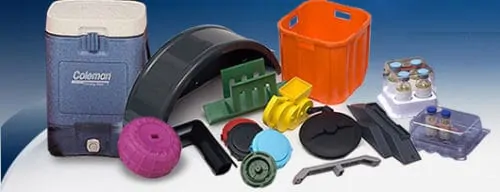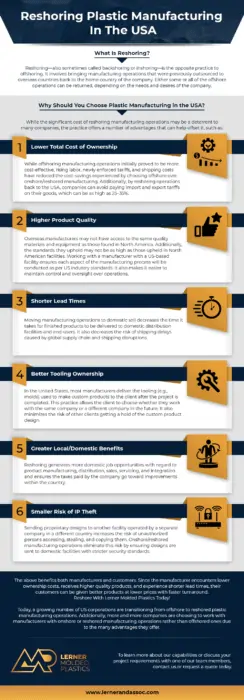In the late 1970s, the increase in global competition, the deficit in trade, and the dismantling of trade barriers led many manufacturers in the United States—including plastic manufacturers—to offshore their operations in an effort to lower production costs. By moving manufacturing operations to China and other overseas countries, they could take advantage of cheaper labor, faster turnaround, and looser regulations. However, over the years, increasing awareness of the inherent problems associated with offshoring—e.g., language/cultural barriers, poor product quality, risk of IP theft, supply chain delays, etc.—have led many manufacturers to look to reshoring their operations to improve cost of ownership. Additionally, with increased pressure to level the playing field, tariffs have been put in place on all Chinese imports, that have lessened the overall competitiveness that China has enjoyed. The field is now ripe for reshoring to blossom.
What Is Reshoring?
Reshoring—also sometimes called backshoring or inshoring—is the opposite practice to offshoring. It involves bringing manufacturing operations that were previously outsourced to overseas countries back to the home country of the company. Either some or all of the offshore operations can be returned, depending on the needs and desires of the company.
Why Should You Choose Plastic Manufacturing in the USA?
While the significant cost of reshoring manufacturing operations may be a deterrent to many companies, the practice offers a number of advantages that can help offset it, such as:
- Lower total cost of ownership. While offshoring manufacturing operations initially proved to be more cost-effective, rising labor, newly enforced tariffs, and shipping costs have reduced the cost-savings experienced by choosing offshore over onshore/reshored manufacturing. Additionally, by reshoring operations back to the USA, companies can avoid paying import and export tariffs on their goods, which can be as high as 25–35%.
- Higher product quality. Overseas manufacturers may not have access to the same quality materials and equipment as those found in North America. Additionally, the standards they uphold may not be as high as those upheld in North American facilities. Working with a manufacturer with a US-based facility ensures each aspect of the manufacturing process will be conducted as per US industry standards. It also makes it easier to maintain control and oversight over operations.
- Shorter lead times. Moving manufacturing operations to domestic soil decreases the time it takes for finished products to be delivered to domestic distribution facilities and end-users. It also decreases the risk of shipping delays caused by global supply chain and shipping disruptions.
- Better tooling ownership. In the United States, most manufacturers deliver the tooling (e.g., molds) used to make custom products to the client after the project is completed. This practice allows the client to choose whether they work with the same company or a different company in the future. It also minimizes the risk of other clients getting a hold of the custom product design.
- Greater local/domestic benefits. Reshoring generates more domestic job opportunities with regard to product manufacturing, distribution, sales, servicing, and integration and ensures the taxes paid by the company go toward improvements within the country.
- Smaller risk of IP theft. Sending proprietary designs to another facility operated by a separate company in a different country increases the risk of unauthorized persons accessing, stealing, and copying them. Onshore/reshored manufacturing operations eliminate this risk by ensuring designs are sent to domestic facilities with stricter security standards.
The above benefits both manufacturers and customers. Since the manufacturer encounters lower ownership costs, receives higher quality products, and experience shorter lead times, their customers can be given better products at lower prices with faster turnaround.
Reshore With Lerner Molded Plastics Today!
Today, a growing number of US corporations are transitioning from offshore to reshored plastic manufacturing operations. Additionally, more and more companies are choosing to work with manufacturers with onshore or reshored manufacturing operations rather than offshored ones due to the many advantages they offer.
If you’re looking for an experienced and knowledgeable US-based plastic manufacturer, turn to the experts at Lerner Molded Plastics! We specialize in plastic manufacturing, offering molding, forming, assembly, design, tooling, and supply chain services. To learn more about our capabilities or discuss your project requirements with one of our team members, contact us or request a quote today.


